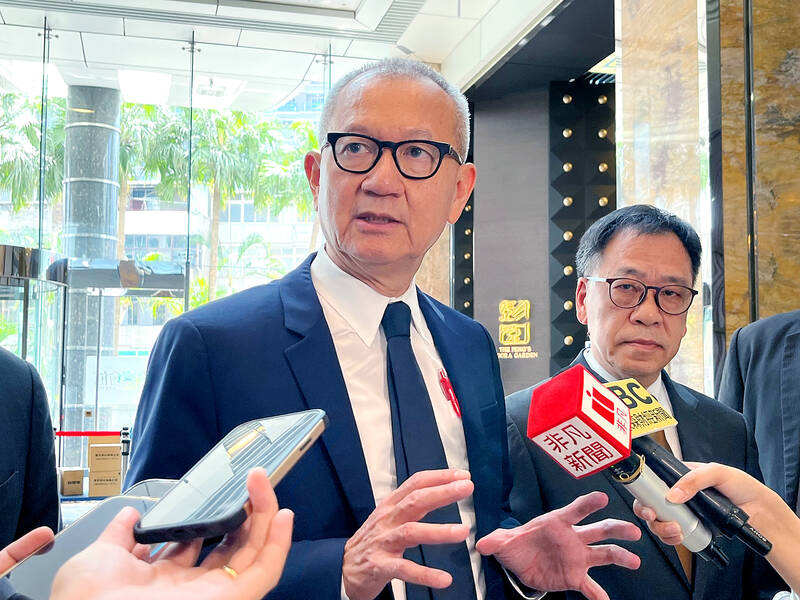Yageo Corp (國巨), the world’s third-largest supplier of multilayer ceramic capacitors, yesterday forecast its second-quarter revenue to stabilize, snapping a three-quarter losing streak.
Consolidated revenue last month was flat at NT$9 billion (US$293 million), compared with the previous month, but declined 14.5 percent from a year earlier, the company said.
Cumulative revenue in the first five months dipped 13.2 percent year-on-year to NT$44.11 billion, as customers scaled back orders amid inventory digestion, it said.

Photo: CNA
It would take at least two quarters for the passive-components sector to work through an excessive inventory of standard parts, it said.
Nevertheless, Yageo said it was better equipped than its peers to weather the inventory correction cycle, given that it supplies premium passive components used in vehicles, and industrial and medical devices.
“From our perspective, the market is likely to recover gradually like an L shape, rather than as a V-shape rebound,” Yageo chairman Pierre Chen (陳泰銘) told reporters on Tuesday following the company’s annual general meeting in Taipei.
As Yageo has been diversifying its product lineups to niche and high-end products, the company would be able to sustain growth, Chen said.
Through mergers, acquisitions and product adjustments, the company has expanded its high-end product revenue contribution to about 80 percent, he said.
Among premium products, passive components used in vehicles registered slight revenue growth, helping the segment’s revenue contribution exceed its 20 percent share target in the first quarter of this year, Chen said.
“We have broken into the first-tier automakers of Japan,” he said.
A decline in passive components used in consumer electronics was also a factor, he added.
The company also sees the industrial, medical and aerospace sectors as key growth areas, he said.
Yageo has tapped into sensor businesses through merger-and-acquisition deals with Heraeus Holding GmbH and Schneider Electric SE, he said.
Those sensors are used in industrial devices and vehicles, he said.
Heraeus Nexensos makes premium platinum thin-film temperature sensors for high-precision measurements, and has operated for more than 100 years in the high-end industrial and automotive segments.
In aerospace, Yageo’s revenue has grown several-fold through its subsidies Kemet Corp and Pulse Electronics Corp, Chen said.
Yageo said its passive components are also used in artificial intelligence (AI) devices such as AI servers from Quanta Computer Inc (廣達) and Wistron Corp (緯創).
“We will not be absent from the AI industry,” Chen said.
Yageo’s components are used in a wide range of electronics and it works with customers in designing new products such as 6G-enabled devices and low Earth orbit satellites, it said.

South Korea’s equity benchmark yesterday crossed a new milestone just a month after surpassing the once-unthinkable 5,000 mark as surging global memory demand powers the country’s biggest chipmakers. The KOSPI advanced as much as 2.6 percent to a record 6,123, with Samsung Electronics Co and SK Hynix Inc each gaining more than 2 percent. With the benchmark now up 45 percent this year, South Korea’s stock market capitalization has also moved past France’s, following last month’s overtaking of Germany’s. Long overlooked by foreign funds, despite being undervalued, South Korean stocks have now emerged as clear winners in the global market. The so-called “artificial intelligence

‘SEISMIC SHIFT’: The researcher forecast there would be about 1.1 billion mobile shipments this year, down from 1.26 billion the prior year and erasing years of gains The global smartphone market is expected to contract 12.9 percent this year due to the unprecedented memorychip shortage, marking “a crisis like no other,” researcher International Data Corp (IDC) said. The new forecast, a dramatic revision down from earlier estimates, gives the latest accounting of the ongoing memory crunch that is affecting every corner of the electronics industry. The demand for advanced memory to power artificial intelligence (AI) tasks has drained global supply until well into next year and jeopardizes the business model of many smartphone makers. IDC forecast about 1.1 billion mobile shipments this year, down from 1.26 billion the prior

People stand in a Pokemon store in Tokyo on Thursday. One of the world highest-grossing franchises is celebrated its 30th anniversary yesterday.

Chinese artificial intelligence (AI) start-up DeepSeek’s (深度求索) latest AI model, set to be released as soon as next week, was trained on Nvidia Corp’s most advanced AI chip, the Blackwell, a senior official of US President Donald Trump’s administration said on Monday, in what could represent a violation of US export controls. The US believes DeepSeek will remove the technical indicators that might reveal its use of American AI chips, the official said, adding that the Blackwells are likely clustered at its data center in Inner Mongolia, an autonomous region of China. The person declined to say how the US government received